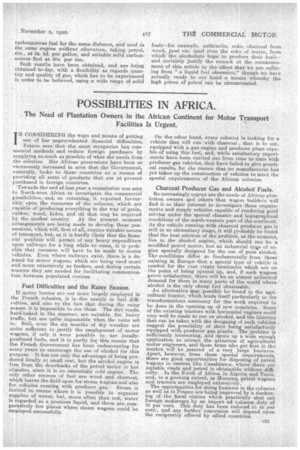POSSIBILITIES IN AFRICA.
Page 19

If you've noticed an error in this article please click here to report it so we can fix it.
The Need oi Plantation Owners in the African Continent for Motor Transport Facilities Is Urgent.
IN CONSIDERING the ways and means of getting out of her unprecedented financial difficulties, France sees that she must reorganize he commercial methods and reduce foreign purchases by supplying as ,much as possible of what she needs from the colonies. Her African possessions have been so enormously increased in area that the Government, naturally, looks to these countries as a means of providing all sorts of products that are at present purchased in foreign countries. .Towards the end of last year a commission was sent to North-west Africa -to investigate the commercial possibilities, and, on returning, it reported favourably upon the resources of the colonies, which are capable of producing everything in the way of grain, rubber, wood, hides, and oil that May be required by the mother country. At the present moment arrangements are being made to develop these possessions, which will, first. of all, require suitable means of transport, but, as it is hardly likely that the financial position will permit of any heavy expenditure upon railways for a long while to come, it is probable that recourse will have to be made to motor vehicles. Even where railways exist, there is a demand for motor wagons, which are being used more and more extensively as feeders, and during certain seasons they are needed for facilitating communicas tion between populated centres. .
Fuel Difficulties and the Rainy Season.
If motor lorries are not mere largely employed in the. French colonies, it is due mainly to fuel difficulties, and also to the fact that during the rainy season it is impossible to run them. The diet roads, hard-baked in the summer, are suitable for heavy traffic, but are quite impassable when the rains set in. Still, even the six months of dry weather are quite sufficient to justify the employment of motor wagons, if only it were possible to use locally produced fuels, and it is partly for this reason that _ the French Government has been endeavouring for many years to encourage the use of alcohol for this purpose. It has not only the advantage of being preduced locally at. small cost, but the alcohol engine is free from the drawbacks of the petrol motor in hot climates, since it is an 'essentially cold engine. The only other sources of fuel are wood and charcoal, which leaves the field open for steam wagons and also for vehicles running with producer gas.. Steam is limited to routes where it is possible to organize supplies of water, but, more often than not, water HI regarded as a precious liquid, and there are comparatively few places where steam wagons could be employed successfully. On the other hand, every colonist is looking for a vehicle that will run with charcoal ; that is to say, equipped with a, gas engine and producer plant capable of using this fuel, and, while satisfactory experiments have been carried out from time to tiine with producer gas vehicles, they have failed to give practical results, for the reason that no manufacturer has yet taken up the construction of vehicles to meet the special requirements of the African colonies.
Charcoal Producer Gas and Akohol Fuels. _
So increasingly urgent are the needs of African plantation_ owners and others -that wagon builders will find it to their interest to investigate these requirements and supply vehicles capable of rendering good seivic.e under the special climatic and topographical conditions of the north-western part of the continent. As the vehicle running with charcoal producer gas is still in an elementary stage, it will probably be found that the best solution of the problem, at the moment, lies in the alcohol engine, which should not be a modified petrol motor, but an industrial tyue of engine specially designed for the use of pure alcohol. The conditions differ so fundamentally from those" existing in Europe that a special type of vehiale is needed for the vast virgin territories which are on the point of being opened up, and, if such wagons prove satisfactory, there will be an almost unlimited demand for them in many parts of the world where alcohol is the only cheap fuel obtainable.
An alternative may possibly be found in the agricultural tractor, which lends itself particularly to the transformations necessary for the work required to be done in the opening up of new countries. Some of the existing tractors with horizontal engines could very well be made to run on alcohol, and the liberties that can be taken with the designing of such vehicles suggest the possibility of their being satisfactorily equipped with.producer gas plants. The, problem is sufficiently interesting, and opens up a wide enough application to attract the attention of agricultural motor engineers, and those firms who get first in the market will be assured of a very large business. Apart, however, from these special requirements, there are good opportunities for disposing of petrol wagons in centres like Casablanca, where there are suitable roads and petrol is obtainable without difficulty.. In the North of Africa, in Algeria and Tunis, and, to a growing extent, in Morocco, petrol wagons and tractors are employed extensively.
The opportunities for doing business in the colonies as well as in France are being improved by a slackening of the fiscal regime which practically shut out foreign rinaEorears by an import ad 'valoremduty of 70 per cent. This duty has been reduced to 45 per cent., and any further concession will depend Upon the reciprocity offered by allied countries.


























































